|
|
|
Sort Order |
|
|
|
Items / Page
|
|
|
|
|
|
|
| Srl | Item |
| 1 |
ID:
121818
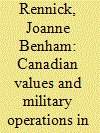

|
|
|
|
|
| Publication |
2013.
|
| Summary/Abstract |
Whereas traditionally religion has played a central role in shaping the shared values in a society, secularization, privatization of religion, and pluralism are changing the values that personnel bring to the Canadian Forces. This late modern reality means that many people who have rejected traditional forms of religion in order to interpret their personal spiritual beliefs for themselves are uncertain about their core values. Differences in values among military personnel are further complicated by the realities of modern military engagements that require a greater need for ethical thinking and moral decision making. This article examines the nature of religion and values in late modern Canadian society and identifies religious leadership as a source of moral and ethical direction as well as consolation in the face of moral anomie. Finally, it highlights the need for greater education about the role of religion and values for military personnel.
|
|
|
|
|
|
|
|
|
|
|
|
|
|
|
|
| 2 |
ID:
077043
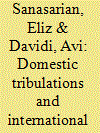

|
|
|
| 3 |
ID:
106539
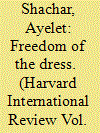

|
|
|
| 4 |
ID:
131481
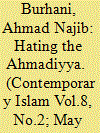

|
|
|
|
|
| Publication |
2014.
|
| Summary/Abstract |
Religious diversity and pluralism is commonly understood within the context of the relation between various religious traditions, not within a single religious tradition. This limitation of the boundary of religious pluralism could overlook the fact that conflict within a single tradition can be bitterer and more disastrous than conflict with other religions. In the last decade, for instance, the Ahmadis in Indonesia have become victims of constant attacks. This article, therefore, intends to study the place of the Ahmadiyya in the context of religious pluralism in Indonesia by answering the following questions: Why was the treatment of the Ahmadis in recent years by Muslims more vitriolic than their treatment of non-Muslims? What is the nature and quality of life for people who have been excluded from a 'normal' religious identity in a time when religious attachment is a necessary fact for that society? Why did the attacks on the Ahmadiyya occur in the present regime, not during the past authoritarian one? This article argues that the charge of heresy issued by Muslim institutions put the Ahmadiyya in liminal status; they are in the zone of indistinction between Muslims and non-Muslims. This makes them vulnerable to persecution since they have been deprived of their rights as Muslims, while their rights as non-Muslims are still suspended. Non-Muslims, particularly ahl al-kit?b (People of the Book), have been accepted theologically in Muslim society, but there is no place of tolerance for heretics. The rise of intolerance in Indonesia parallels the rise of religious conservatism after the fall of Suharto in 1998.
|
|
|
|
|
|
|
|
|
|
|
|
|
|
|
|
| 5 |
ID:
157610
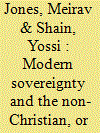

|
|
|
|
|
| Summary/Abstract |
This article participates in efforts by IR theorists to clarify aspects of modern sovereignty – an idea currently in rupture and being rethought – by returning to its founding ‘Westphalian moment’. While recent work has reconnected modern sovereignty to religion, considering Westphalia as a religious settlement and Christian concerns persisting in the groundwork of IR, our work looks beyond Christian concerns and asks how Westphalian sovereignty addressed non-Christians. We trace a yet-untapped discussion of the Jews – presented as a paradigmatic religious ‘other’ – among architects of Westphalian sovereignty from Bodin through Grotius, Hobbes, Harrington, and Spinoza. We demonstrate that foundational theorists of modern sovereignty considered religious diversity a political problem. Some cited essential sameness, minimising difference between Jews and Christians. Others considered the possibility of Jewish sovereignty long before this idea is usually considered to have entered modern consciousness. While the discussion of Jewish sovereignty among architects of modern sovereignty may seem to justify a Jewish state in a world of Westphalian states, it also emphasises Westphalia’s territorialising of religious difference. This aspect of the Westphalian framework is surely inadequate today, when territorialising religious difference is neither normative nor likely possible.
|
|
|
|
|
|
|
|
|
|
|
|
|
|
|
|
| 6 |
ID:
173754
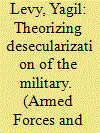

|
|
|
|
|
| Summary/Abstract |
This article addresses scholarly deficiencies in identifying the conditions under which the desecularization of militaries takes place. To theorize this process, two militaries are studied, the United States and Israel. Arguably, six drivers sequentially generate the desecularization of the militaries: (1) Militaries largely mirror the growing influence of religion in the broader society. However, intramilitary drivers play their role in promoting/mitigating the extra-military mechanisms of desecularization. Thus, (2) organizational interests along with external constraints drive militaries to promote religious diversity, which may (3) lead to the empowerment of religious actors, and thereby to further desecularization through religious intolerance, and to (4) reliance on the spiritual and religious services provided by military chaplains, and jointly stimulate (5) the use of religion to motivate military sacrifice. By religiously increasing the symbolic value of military sacrifice, (6) religiosity becomes more naturally associated with good soldiering, thereby reshaping intramilitary hierarchies and, hence, further triggering desecularization.
|
|
|
|
|
|
|
|
|
|
|
|
|
|
|
|
|
|
|
|
|